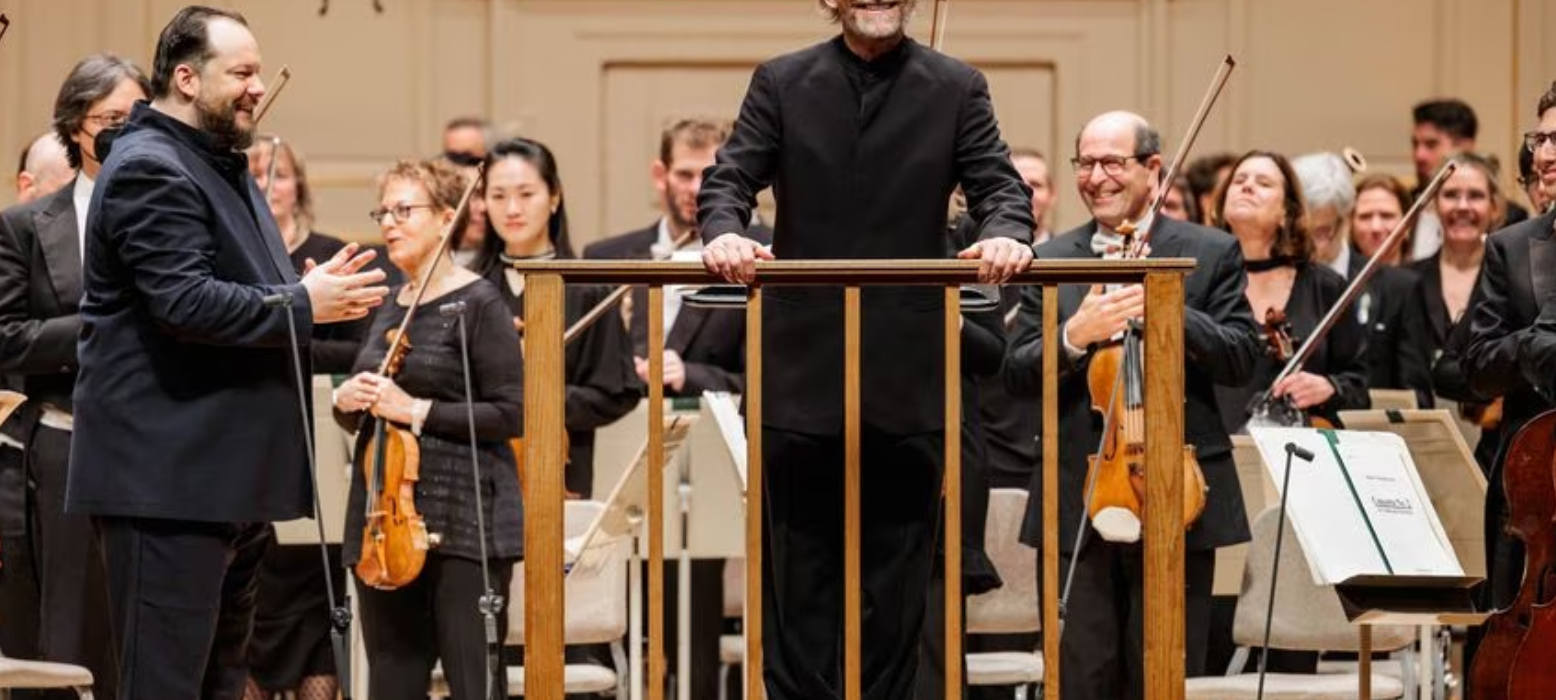On Thursday night in Symphony Hall, Andris Nelsons returned to the podium with works by Brahms, Shostakovich, and a new ‘Concerto for Curved Space’ by Steven Mackey
Only through art, Proust writes, are we released from the confines of our own senses and allowed to look out at the world through another’s perspective, “to possess other eyes.” Without such new ways of seeing, he explains, even a trip to Mars or Venus would only yield vistas similar to those we see on Earth. But immersed in the work of a genuine artist, he concludes, “we really do fly from star to star.”
The passage returned to mind as composer Steven Mackey explained the inspiration underlying the interstellar journey within his own “Concerto for Curved Space,” which received its world premiere Thursday night at Symphony Hall. Mackey, a longtime member of the composing faculty at Princeton, was struck by the stunning images generated by the Webb telescope, with their extraordinary play of color and texture. His new work, which had its origin in a series of guitar etudes, is similarly kaleidoscopic in its shifting masses of sonority and hazy bands of color achieved in part through the use of microtones.
The piece, however, is far more than an exercise in tone painting. Divided into four movements of increasing scope totaling some 30 minutes of music, it loosely takes the form of a concerto for orchestra, spotlighting different sections through sinuous string writing, gossamer textures in the woodwinds, bright splashes of percussion, and forcefully etched brass lines.
Fortunately, Mackey’s sonic imagination is coupled with a deep mastery of craft, and a concept that in lesser hands might easily have devolved into a primordial chaos instead emerges as an organically evolving, living and breathing entity. “Concerto for Curved Space,” which was given an attentive and vibrant reading on Thursday by Andris Nelsons and the BSO, is a major accomplishment, one that deserves to be taken up by other orchestras. It turned out to be the high point of Thursday’s program.
Mackey’s work was followed by Shostakovich’s Violin Concerto No. 2, with the Latvian violinist Baiba Skride as soloist. Skride is a familiar presence at this point, and in fact during the Nelsons era, she has appeared almost every season, effectively becoming a
https://www.bostonglobe.com/2023/01/27/arts/bso-launching-new-concerto-into-orbit/ 2/4
1/31/23, 10:38 AM At BSO, launching a new concerto into orbit – The Boston Globe
kind of house violin soloist. Regardless of the fact that she is a capable, versatile player, it’s worth considering whether any one soloist — even Jascha Heifetz back from the dead — should be heard so frequently, or whether BSO listeners deserve exposure to a wider cross-section from the immense pool of talent in the field today.
In this case Skride had the challenging assignment of bringing to life Shostakovich’s Second Violin Concerto, a moody, atmospheric piece with little of the native drama and heroism the composer invested in his First Concerto. For her part Skride conveyed the music with a crisp technique and moments of conviction, but her playing never really caught fire and overall had little of the coloristic variety or expressive depth required to truly lift this performance onto a higher interpretive plane. It didn’t help that balances with the orchestra were sometimes askew, with the solo line in those moments being covered by the collective sound.
After intermission, Nelsons and the BSO took on Brahms’s Fourth Symphony, also with uneven results. This is potently tragic music on its own terms, and the orchestra’s performance had no shortage of distinguished playing from individual sections and soloists, but Nelsons’s choice of ponderously slow tempos sapped something of the music’s life, its drive, and its broader expressive arcs. He has fared much better with Brahms on past occasions.
Happily there were at least signs of progress in the orchestra’s longstanding search for its next concertmaster, as the presumptive finalists have begun cycling through town. Occupying the prized seat at Thursday’s performance was Nurit Bar-Josef, currently the concertmaster of the National Symphony and previously an assistant concertmaster of the BSO and the Pops (1998-2001). It is impossible to assess her chemistry with the orchestra based on one performance, but her leadership from the front of the section seemed both subtle and clear. More candidates will be heard in the weeks ahead.
– By The Boston Globe
